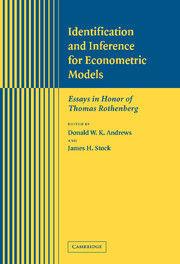Book contents
- Frontmatter
- Contents
- List of Contributors
- Preface
- Part I Identification and Efficient Estimation
- Part II Asymptotic Approximations
- Part III Inference Involving Potentially Nonstationary Time Series
- 15 Tests of the Null Hypothesis of Cointegration Based on Efficient Tests for a Unit MA Root
- 16 Robust Confidence Intervals for Autoregressive Coefficients Near One
- 17 A Unified Approach to Testing for Stationarity and Unit Roots
- 18 A New Look at Panel Testing of Stationarity and the PPP Hypothesis
- 19 Testing for Unit Roots in Panel Data: An Exploration Using Real and Simulated Data
- 20 Forecasting in the Presence of Structural Breaks and Policy Regime Shifts
- Part IV Nonparametric and Semiparametric Inference
20 - Forecasting in the Presence of Structural Breaks and Policy Regime Shifts
Published online by Cambridge University Press: 24 February 2010
- Frontmatter
- Contents
- List of Contributors
- Preface
- Part I Identification and Efficient Estimation
- Part II Asymptotic Approximations
- Part III Inference Involving Potentially Nonstationary Time Series
- 15 Tests of the Null Hypothesis of Cointegration Based on Efficient Tests for a Unit MA Root
- 16 Robust Confidence Intervals for Autoregressive Coefficients Near One
- 17 A Unified Approach to Testing for Stationarity and Unit Roots
- 18 A New Look at Panel Testing of Stationarity and the PPP Hypothesis
- 19 Testing for Unit Roots in Panel Data: An Exploration Using Real and Simulated Data
- 20 Forecasting in the Presence of Structural Breaks and Policy Regime Shifts
- Part IV Nonparametric and Semiparametric Inference
Summary
ABSTRACT
When no model coincides with a nonconstant data generation process, forecast failure occurs, and noncausal statistical devices may provide the best available forecasts: examples include intercept corrections and differenced-data VARs. However, such models are not a reliable basis for economic policy analyses and may even have no policy implications. Indeed, a “paradox” can result if their forecasts induce policy changes, which in turn alter the data outcome. This suggests correcting statistical forecasts by using the econometric model's estimate of the “scenario” change, and doing so is shown to yield reduced forecast-error biases.
INTRODUCTION
As the title of this volume indicates, the majority of Tom Rothenberg's contributions to econometrics and statistics were in the fields of identification and inference. However, we know that Tom has an interest in all areas of econometrics, even though his awareness of the numerous difficulties to be overcome in undertaking applied work has so far led him to concentrate on theoretical research topics. Therefore, we are delighted to offer our chapter on the use of econometric models in forecasting and economic policy analysis as an indication of some more problems – as well as an analysis of how several of these might be overcome.
A personal anecdote will explain our interest. When the first author reported in Hendry (1981) to the UK Parliamentary Select Committee on the Treasury and Civil Service Enquiry into Monetary Policy, he complained about the proliferation of theoretical models of money and the dearth of reliable empirical evidence; a decade later in Hendry (1991), he complained to the same committee (now on Official Economic Forecasting) about the abundance of empirical evidence on forecasting – and the absence of theoretical models thereof! We hope to fill a part of that second gap.
- Type
- Chapter
- Information
- Identification and Inference for Econometric ModelsEssays in Honor of Thomas Rothenberg, pp. 480 - 502Publisher: Cambridge University PressPrint publication year: 2005
- 11
- Cited by



